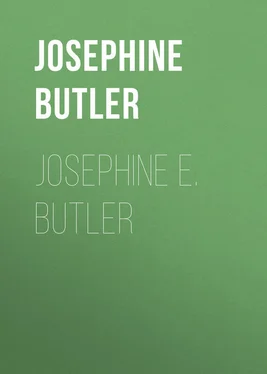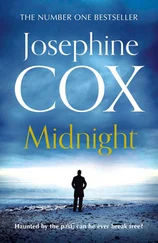Josephine Butler - Josephine E. Butler
Здесь есть возможность читать онлайн «Josephine Butler - Josephine E. Butler» — ознакомительный отрывок электронной книги совершенно бесплатно, а после прочтения отрывка купить полную версию. В некоторых случаях можно слушать аудио, скачать через торрент в формате fb2 и присутствует краткое содержание. Жанр: foreign_antique, foreign_prose, на английском языке. Описание произведения, (предисловие) а так же отзывы посетителей доступны на портале библиотеки ЛибКат.
- Название:Josephine E. Butler
- Автор:
- Жанр:
- Год:неизвестен
- ISBN:нет данных
- Рейтинг книги:5 / 5. Голосов: 1
-
Избранное:Добавить в избранное
- Отзывы:
-
Ваша оценка:
- 100
- 1
- 2
- 3
- 4
- 5
Josephine E. Butler: краткое содержание, описание и аннотация
Предлагаем к чтению аннотацию, описание, краткое содержание или предисловие (зависит от того, что написал сам автор книги «Josephine E. Butler»). Если вы не нашли необходимую информацию о книге — напишите в комментариях, мы постараемся отыскать её.
Josephine E. Butler — читать онлайн ознакомительный отрывок
Ниже представлен текст книги, разбитый по страницам. Система сохранения места последней прочитанной страницы, позволяет с удобством читать онлайн бесплатно книгу «Josephine E. Butler», без необходимости каждый раз заново искать на чём Вы остановились. Поставьте закладку, и сможете в любой момент перейти на страницу, на которой закончили чтение.
Интервал:
Закладка:
The following is from a brief diary of the close of that sad year —
October 30th. – Last night I slept uneasily. I dreamed I had my darling in my arms, dying; that she struggled to live for my sake, lived again a moment, and then died. Just then I heard a sound, a low voice at my door, and I sprang to my feet. It was poor Stanley (our second son), scarcely awake, and in a fever. I took him in my arms, and carried him back to his bed, from which he had come to seek my help. In the morning he could not swallow, and pointed to his throat. Dr. Ker came and said he had diphtheria. My heart sank. I wondered whether God meant to ask us to give up another child so soon.
His illness was very severe, and for some days he hovered between life and death. But we were spared the added sorrow we dreaded. When he was sufficiently recovered, it was thought better that I should go with him abroad, to escape the winter’s cold, and for a change of scene from that house round which clung the memory of such a tragic sorrow. My husband and other sons came to London with us, and a pleasant and able courier was engaged, who accompanied me and my little convalescent to Genoa, where we had been invited by kind relatives living there.
At the end of this visit it was arranged that I should accompany my sister to Naples, when we learned that the railway and roads were flooded, and that travelling by land would be difficult and even dangerous. Being unwilling to give up the long-cherished hope of a visit to my sister’s home, I proposed that we should go by sea. My sister, though fearing a sea voyage for me in winter, assented to the arrangement, and as the weather was then very calm we started with good hopes. I had not, however, realised the gravity of the shock which my health had sustained before leaving England.
On this voyage she was taken very seriously ill, nigh unto death. “I was kneeling,” writes her sister, “and rubbing her hands and feet, trying to warm them; and while my imagination was realising all the terrors, my heart was praying desperately to God that He would make a way of escape, that He would work a miracle for us. And He did. The three boys went away and all prayed to God to save her. After a time I felt a hand on my shoulder. It was the captain. He said: ‘I saw the other mail vessel coming north, and I have signalled her. If she sees us you shall go on board and return to Leghorn. Make haste!’ I drew a long breath and said: ‘Thank God, I think we are saved!’ I felt the horror melting away in a measure, and hope springing up. We rolled her up, and I went for the weeping children, and found the kind young Sicilian officer comforting them. I thanked him. He said, in Italian, something about the love of Christ, so kindly. I had said very little about her. People must have been impressed with her look, and thought her dying, to take such extreme measures as to stop the two Government steamers on the high seas.”
CHAPTER IV.
LIVERPOOL
In the winter of 1865 my husband received one day a telegraphic message from Mr. Parker, of Liverpool, asking him if he would be willing to take the Principalship of the Liverpool College, vacated by the retirement of Dr. Howson, who became Dean of Chester. He accepted the invitation as providential, and went to Liverpool to see Mr. Parker, the directors of the college, and others interested in the choice of a new principal. There was no hesitation about the matter, and he was shortly afterwards elected. Our removal to Liverpool took place in January, 1866.
Liverpool is one of the largest seaports of the world. No greater contrast could have been found than it presented to the academic, intellectual character of Oxford, or the quiet educational and social conditions at Cheltenham. Its immense population, with a large intermingling of foreign elements, its twelve miles of docks lined with warehouses, its magnificent shipping, its cargoes and foreign sailors from every part of the world and from every nation of the earth, its varieties in the way of creeds and places of worship, its great wealth and its abject poverty, the perpetual movement, the coming and going, and the clash of interests in its midst – all these combined to make Liverpool a city of large and international character, and of plentiful opportunities for the exercise of public spirit and catholic sentiment. The college shared the characteristics of the city in the midst of which it was set. Among its eight to nine hundred pupils there were Greeks, Armenians, Jews, Negroes, Americans, French, Germans, and Spaniards, as well as Welsh, Irish, Scotch and English. These represented many different religious persuasions. A man of narrow theological views would scarcely have found the position as head of such a school agreeable. Firmness and simplicity of faith, truth, charity and toleration, were qualities which were needed in the administrator of such a little world of varied international and denominational elements. The principalship must be held, by the rules of the college, by a member of the Church of England, and the directors had been happy in finding churchmen who were willing to accept the conditions presented, and able to work well in the midst of them. There were, as pupils at the college, the sons of two half-civilised African kings, Oko Jumbo and Jah-Jah. Their fathers having been old and sworn enemies, the two little fellows began their school acquaintance with many a tussle true to the inherited instinct. They were good boys, however, and one of them – afterwards a convinced and consistent Christian – became a missionary among his own countrymen, in spite of much opposition and even persecution, it was said, from his own father.
When we came to Liverpool in 1866, and my husband and sons began their regular life at the College, going there early and returning in the evening, I was left many hours every day alone, empty-handed and sorrowful, the thought continually returning, “How sweet the presence of my little daughter would have been now.” Most people, who have gone through any such experience, will understand me when I speak of the ebb and flow of sorrow. The wave retires perhaps after the first bitter weeks, and a kind of placid acquiescence follows. It may be only a natural giving way of the power of prolonged resistance of pain. Then there comes sometimes a second wave, which has been silently gathering strength, holding back, so to speak, in order to advance again with all its devouring force, thundering upon the shore. But who can write the rationale of sorrow? And who can explain its mysteries, its apparent inconsistencies and unreasonableness, its weakness and its strength? I suffered much during the first months in our new home. Music, art, reading, all failed as resources to alleviate or to interest. I became possessed with an irresistible desire to go forth and find some pain keener than my own, to meet with people more unhappy than myself (for I knew there were thousands of such). I did not exaggerate my own trial. I only knew that my heart ached night and day, and that the only solace possible would seem to be to find other hearts which ached night and day, and with more reason than mine. I had no clear idea beyond that, no plan for helping others; my sole wish was to plunge into the heart of some human misery, and to say (as I now knew I could) to afflicted people, “I understand: I too have suffered.”
It was not difficult to find misery in Liverpool. There was an immense workhouse containing at that time, it was said, five thousand persons – a little town in itself. The general hospital for paupers included in it was blessed then by the angelic presence of Agnes Jones (whose work of beneficence was recorded after her death); but the other departments in the great building were not so well organised as they came to be some years later. There were extensive special wards, where unhappy girls drifted like autumn leaves when the winter approached, many of them to die of consumption, little cared for spiritually; for over this portion of the hospital Agnes Jones was not the presiding genius. There was on the ground floor a Bridewell for women, consisting of huge cellars, bare and unfurnished, with damp stone floors. These were called the “oakum sheds,” and to these came voluntarily creatures driven by hunger, destitution, or vice, begging for a few nights’ shelter and a piece of bread, in return for which they picked their allotted portion of oakum. Others were sent there as prisoners.
Читать дальшеИнтервал:
Закладка:
Похожие книги на «Josephine E. Butler»
Представляем Вашему вниманию похожие книги на «Josephine E. Butler» списком для выбора. Мы отобрали схожую по названию и смыслу литературу в надежде предоставить читателям больше вариантов отыскать новые, интересные, ещё непрочитанные произведения.
Обсуждение, отзывы о книге «Josephine E. Butler» и просто собственные мнения читателей. Оставьте ваши комментарии, напишите, что Вы думаете о произведении, его смысле или главных героях. Укажите что конкретно понравилось, а что нет, и почему Вы так считаете.












